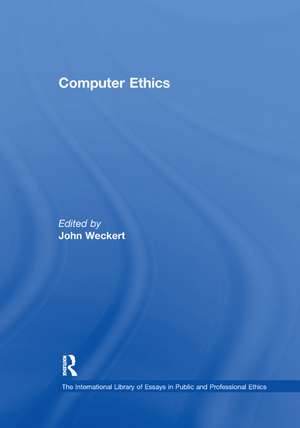Computer Ethics: The International Library of Essays in Public and Professional Ethics
Editat de John Weckerten Limba Engleză Paperback – 10 iun 2019
Preț: 470.51 lei
Nou
Puncte Express: 706
Preț estimativ în valută:
90.03€ • 94.25$ • 74.50£
90.03€ • 94.25$ • 74.50£
Carte tipărită la comandă
Livrare economică 05-19 aprilie
Preluare comenzi: 021 569.72.76
Specificații
ISBN-13: 9781138383517
ISBN-10: 1138383511
Pagini: 516
Dimensiuni: 178 x 254 x 30 mm
Greutate: 0.95 kg
Ediția:1
Editura: Taylor & Francis
Colecția Routledge
Seria The International Library of Essays in Public and Professional Ethics
Locul publicării:Oxford, United Kingdom
ISBN-10: 1138383511
Pagini: 516
Dimensiuni: 178 x 254 x 30 mm
Greutate: 0.95 kg
Ediția:1
Editura: Taylor & Francis
Colecția Routledge
Seria The International Library of Essays in Public and Professional Ethics
Locul publicării:Oxford, United Kingdom
Cuprins
Contents: Series Preface; Introduction; Part I Computer Ethics - Its History and Nature: Ethical challenges to citizens of 'the automatic age': Norbert Wiener on the information society, Terrell Ward Bynum; Some Moral and technical consequences of automation, Norbert Wiener; Rules of ethics in information processing, Donn B Parker; The 2 cultures of the computer age, Joseph Weizenbaum; On the impact of the computer on society: how does one insult a machine?, Joseph Weizenbaum; What is computer ethics?, James H. Moor; 4 ethical issues of the information age, Richard O. Mason; Is there an ethics of computing?, Geoffrey Brown; The use and abuse of computer ethics, Donald Gotterbarn; Information ethics: on the philosophical foundations of computer ethics, Luciano Floridi. Part II Cyberspace: Balancing intellectual property rights and the intellectual commons: a Lockean analysis, Herman T. Tavani; What is so bad about internet content regulation?, John Weckert; Unreal friends, Dean Cocking and Steve Matthews; Developing trust on the internet, Victoria McGreer; The computer revolution and the problem of global ethics, Krystyna Gorniak-Kocikowska; Computer-mediated colonization, the renaissance, and educational imperatives for an intercultural global village, Charles Ess; Shaping the web: why the politics of search engines matters, Lucas D. Introna and Helen Nissenbaum; Part III Values and Technology: Do artefacts have politics?, Langdon Winner; Towards ethical principles for designing politico-administrative information systems, M.J. van den Hoven; Bias in computer systems, Batya Friedman and Helen Nissenbaum; Method in computer ethics: towards a multi-level interdisciplinary approach, Philip Brey. Part IV Responsibility and Professionalism: Human agency and responsible computing: implications for computer system design, Batya Friedman and Peter H. Kahn Jr ; Informatics and professional responsibility, David Gotterbarn; Do engineers have social responsibilities?, Deborah G. Johnson; Computing and accountability, Helen Nissenbaum; Using the new ACM code of ethics in decision making, Ronald E. Anderson, Deborah G. Johnson, Donald Gotterbarn and Judith Perolle. Part V Privacy and Surveillance: Are computer hacker break-ins ethical?, Eugene H. Spafford; A moral approach to electronic patient records, N.B. Fairweather and S. Rogerson; Privacy and the varieties of informational wrongdoing, Jeroen van den Hoven; Protecting privacy in an information age: the problem of privacy in public, Helen Nissenbaum; Privacy, the workplace and the internet, Seumas Miller and John Weckert; Surveillance in employment: the case of teleworking, N. Ben Fairweather. Part VI What Computers Should Not Do: Are there decisions computers should never make? James H. Moore; Computers in control: rational transfer of authority or irresponsible abdication of autonomy? Arthur Kuflik; On becoming redundant or what computers shouldn't do, James Lenman. Part VII Morality and Machines: Men, machines, materialism, and morality, Peter T. Manicas; Can robots be moral?, Laszlo Versenyi ; A code of conduct for robots coexisting with human beings, Shigeo Hirose; Information, ethics, and computers: the problem of autonomous moral agents, Bernd Carsten Stahl; Name Index.
Notă biografică
John Weckert is a Professorial Fellow at the Centre for Applied Philosophy and Public Ethics, Charles Sturt University, Australia.
Descriere
These essays focus on the study of the ethical issues related to computer use. Grouped into sections, the essays cover all the important issues ranging from the history and nature of computer ethics, cyberspace, values and technology, and responsibility and professionalism, to privacy and surveillance, what computers should not do, and morality and machines.











